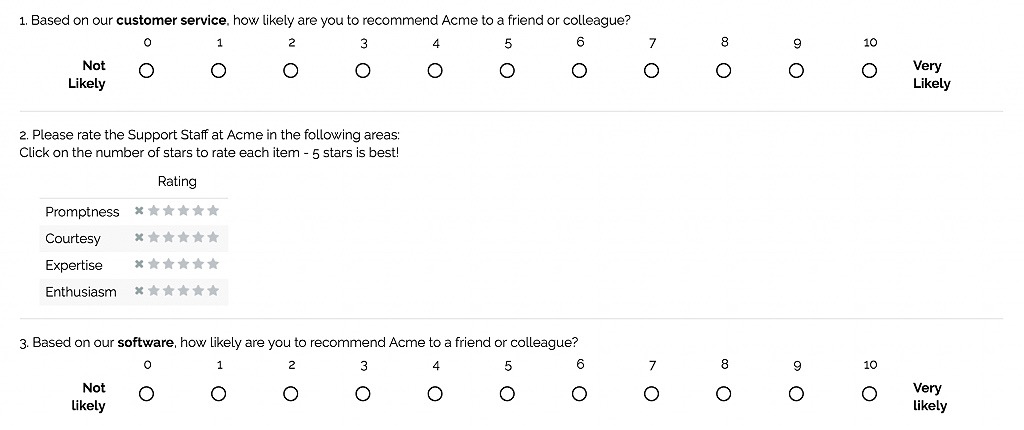Slurvey

"You're doing just about as well as anyone could reasonably expect, given the circumstances."
I visited my nurse practitioner last week, so I could hardly feign surprise when the easily anticipated customer satisfaction survey showed up in my message queue. My first thought insisted that I should just delete that sucker before it spread, but I felt too lazy for such decisive action then. I this morning decided to just open up the link to discover if anything there might prompt me to respond. I was pleased to find that this survey had been designed as I believe all surveys really should be designed. I could respond to any question by not registering a response to that question, a critically important feature of any useful survey, lest the designer's presumption that their target might provide useful information to any question doom the potential relevance of the whole danged instrument. I usually peruse these damned things before deleting, if I even peruse first, but this time I decided to duck through the small gauntlet of questions by not responding to any of them before completing the two designated optional boxes at the end. I told them who I was and how they might contact me, then slammed the enter key (which, predictably, exited me from that domain.)
I despise surveys because they almost always ask the wrong questions, and sometimes fail to even successfully present a single wrong question, but simply irrelevant ones. The H1 Headline says it all: Customer Satisfaction Survey, as if the purpose of the exercise might be for me to help them determine how satisfied I am, the implication being that they'd somehow satisfied me or pissed me off. These surveys seem to be about me and my perceptions, though viewed from a slightly sideways perspective, they're all about the questioner. In social situations, polite society has long considered unseemly any overt begging for complements. In the survey world, it seems more unseemly not to beg for them, though one must more circumspectly cloak inherent neediness. Asking, "How well did we do?", discloses a disturbing lack of self awareness. As a consultant, I might reply, "How well did you feel you did?", if only to nudge the inquiry out of any easily quantifiable form toward assessing inevitably more meaningful subjective feelings. I won't easily admit to your having made me into your subject matter expert. I'm not even a nurse practitioner. By what means could I possibly presume to understand how to judge whatever it is you're doing? You might just as well ask the chair I'm sitting in. (Note: It's a predictably horrible chair, but I won't hold that against you.]
And so the survey unfolds, with one unseemly query following another. Should I simply respond, I become complicit. Should I simply not respond, I might be considered non-compliant, uncaring, instead of someone so confused by a ballot of perfunctory judgeships and opaque ballot initiatives that I couldn't imagine HOW to vote, not out of complacency but deep-seated embarrassment. I honestly cannot understand the purpose of most of the questions. My most generous interpretation might lead me to conclude that the inquisitor cannot understand the least little bit about what it might mean to be their customer. Customers were never intended to be satisfied, let alone delighted by whatever service you provide, especially if that service involves poking, prodding, and prescribing. No, I did not schedule that diagnostic exam, not to prove my obtuseness, but because I do not understand the relevance of it and fear that I cannot explain what in the heck I'm requesting when I call to schedule it, because I don't understand what in the heck you've insisted that I request. I'm not even a nurse practitioner, for cripes sake. I quite honestly forget to request that shingles vaccine when I visit the pharmacy, probably because a pharmacy doesn't provide a proper context for remembering to ask for a vaccine. It seems unseemly to get one there.
No customer wants the dependency their provider demands. They'd rather provide that product or service for them self, but cannot. We are not, after all, nurse practitioners. This foundation obviates any possibility of the provider ever satisfying their customer. The mindful provider might acknowledge this inherent asymmetry and forego the bludgeoning satisfaction survey, recognizing that satisfaction might sit beside any actionable point. Presume, instead, that your customer would agree to dump you in a flash if only they could. Treat us like the indentures we are. Abuse us if you must, but do not come back like a creepy smiling spinster aunty to ask us to rate how much we enjoyed the abuse on an easily quantifiable scale of zero to seven. Invite me to speak up if I believe that you might help me. Encourage yourself to deny me what you cannot reasonably provide, like satisfaction. Your website/health care facility/grocery store/government office offends me. You asking me how you might offend me less just misses the point of any commercial relationship. If you want to delight me, give what you do away for free. Stop by and visit me rather than insisting that I brave the blizzard to visit you. Most of all, stop asking me how you're doing. You're doing just about as well as anyone could reasonably expect, given the circumstances.
©2019 by David A. Schmaltz - all rights reserved


